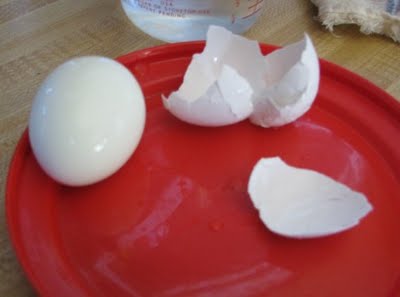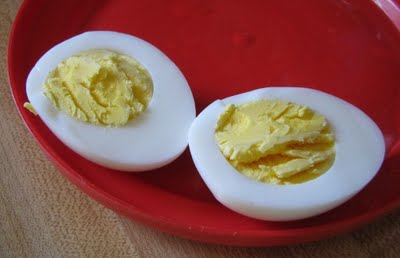 Okay, Coffee Mates, I want you to take a good look at the above photo. See that smooth and silky perfectly peeled egg? See the shell, lifted from said egg in almost one piece? It would have been one piece but I was so startled, I twitched a bit and tore the little section off.
Okay, Coffee Mates, I want you to take a good look at the above photo. See that smooth and silky perfectly peeled egg? See the shell, lifted from said egg in almost one piece? It would have been one piece but I was so startled, I twitched a bit and tore the little section off.There is nothing particularly earth-shaking about a smoothly peeled egg -- unless it happens to be a FRESH egg. Remember in yesterday's post how I mentioned a factoid I've always found to be true -- the shells of fresh eggs cling so tenaciously to the white that your hard boiled eggs end up looking like they've been chewed by starving hamsters. You always, always choose not-so-fresh eggs for hard boiling.
I think I may have been suffering under a misapprehension, at least in part. I still believe it to be true that fresh eggs, when boiled, are nearly impossible to peel neatly. But eggs that have been steamed to the hard cooked stage -- ahhhhh. That's a different yolk entirely.
Frankly, I had never heard of steaming eggs until I did some general research this morning, inspired by Drew after his comment on the last post. Thank you, Drew! It was while reading the comments of others who had faced the peeling problem that I came across the steaming tip. Further research showed it to be a not uncommon method for achieving hard "boiled" eggs and almost all the tipsters insisted it made peeling slick and easy even for fresh eggs!
Just for contrast, here's my tried and true method for boiling the (not so fresh) eggs. Put them all in a pan, single layer, and cover with cold water. Bring to a boil, turn off the heat, slap on a lid, and let the eggs sit for 20 minutes. Put the pan in the sink and run cold water in until all the hot water is gone and the eggs are cooling their round heels. (Note: some folks suggest putting salt or vinegar in the cooking water to prevent cracked shells. Salt makes the whites come out a bit rubbery. Don't know about the vinegar. I don't bother with either and rarely have a cracked shell.) Crack each egg against the side of the sink and, starting at the big end (where the air pocket is), peel the egg under running water.
Now here's what I did with the steam method: not willing to experiment with the whole dozen, I slipped one egg out of the carton and carefully slid it into a measuring cup full of water. Yup. Very fresh. The egg insisted on laying flat on its side, absolutely refusing to attempt any effort at rising. It languished. I suppose I should have taken a picture of it in that state but I'm sure you will believe me when I tell you it was definitely a fresh specimen.
Okay. As it happens, the shallow steamer pan for my pressure cooker fits quite nicely in my biggest saucepan. I put plenty of water in the pan (but not up to the bottom of the steam tray), brought it to a boil, turned the heat down to medium, put the egg in the steam tray and plopped the lid on. Set the timer for 20 minutes. (I read instructions for steaming anywhere from 12 minutes to 30 minutes. Since the egg came right from the refrigerator, I figured 20 was about right.) While the egg was steaming, I put the measuring cup of water in the freezer to chill. Some folks insist on bathing cooked eggs in ice water. I didn't have any ice handy. It didn't matter.
Once the 20 minutes was up, I transferred the egg, via tongs, to the cold water and let it sit for a couple of minutes. Had some sips of coffee. Crossed my fingers. Pulled the now-cool egg out of the water, cracked the shell good on the sink and held it under running water. Started the peeling process, expecting to work as delicately as I had to do yesterday with the slightly older eggs.
OMG!!!! The shell practically leaped off the egg! I could not believe it. And, yes, 20 minutes was quite sufficient to cook the yolk just right. (See photo below.) I'm lovin' me this steamer method, I'm tellin' ya! Now, I realize one measly little egg is not statistically significant so I can't really say steam cooking the eggs will always allow even fresh ones to peel smoothly. But, you know what? I'm certainly willing to do it again, just in the interests of scientific research. (Trying to assume a serious, Einsteinian expression.)
 Oh! For what it's worth, here's another tip I ran across: To center the yolks for deviled eggs, sit the carton of eggs on its side in the refrigerator for 24 hours. I have no idea if this works or not but there is a vision in my mind's eye of the yolk lining up smartly like the bubble in a carpenter's level.
Oh! For what it's worth, here's another tip I ran across: To center the yolks for deviled eggs, sit the carton of eggs on its side in the refrigerator for 24 hours. I have no idea if this works or not but there is a vision in my mind's eye of the yolk lining up smartly like the bubble in a carpenter's level.For information on the freshness test, you might enjoy the photos at the Recipe Hut. Also, the What's Cooking America site has lots of egg info. If you check in the left-hand side bar, clicking on the link for "Why do some eggs float?" will give you even more fresh-test info.
Well! I don't know about y'all but I've had an egg-ceptionally informative morning. And there's still time to look around for new worlds to conquer. Either that or imitate my fresh eggs and spend the afternoon languishing.

9 comments:
Not to throw ice-water on your theory, since I haven't tried it myself... I thought that if you put your hard-boiled eggs into ice water, the shells would slide off nicely. Perhaps it's the ice water bath and not the steaming that makes the shell come off easily? Go ahead and experiment (and save me the trouble!). You may submit your report to us tomorrow. ;)
I get a pretty clean peel by cooking the eggs in the normal way, just after breakfast, cooling them down on the counter, and then putting them in the fridge until lunch-time. They seem to give up their shells without the aid of hamsters after that.
Now you've got me wanting to try steaming. My guess is that it cooks more gently, so the membrane doesn't get tough.
Now that I'm thinking about it, I always tell people to let meat rest after cooking, to let the proteins relax. Eggs are protein. Maybe there's something to John's idea of just leaving them be for a while before peeling.
Here, I get the water to a boil and put the eggs in. With tongs on days that I'm sorta smart. Cut the heat, cover and simmer for 5 or 6 minutes. Then into ice water. Or at least under the cold water from the faucet.
Sometimes I forget to start the water and put the eggs in cold water. So, simmer for 10 minutes.
They peel. The yolks are yellow, not gray.
Fresh eggs? Uh, I'm collecting 18 to 20 eggs a day, I have 38 dozen in the fridge at the moment. I'll let you do the math as to how old my eggs are.
Am I understanding John correctly? That the eggs are boiled and just set out on a towel to cool, then to the fridge? That seems easier and saves ice and water.
As for off-center yolks when deviling, no problem. Just boil extra and eat the mistakes... as samples. :)
Boy, you people are fast! And fairly merciless, I might add. So much for my tentative plans to languish this afternoon. Sheesh.
Wolfie, are you talking about FRESH eggs? As for the ice water, as I said, it didn't matter. That wasn't ice water -- just tap water that had chilled while the egg was steaming. I probably could have gotten the same effect by letting the faucet run a bit.
John and Drew -- the longer waiting period has some interesting possibilities. John, it sounds like you didn't give them the cold water bath at all. Slower cool-down. Hmmm. The fast cool-down is supposed to stop the cooking, which is supposed to prevent overcooking, which is supposed to be a cause of rubbery whites and the obnoxious green ring around the yoke.
Oy! Assorted experiments are whirling around in my alleged brain. "What fresh hell is this?" if I may quote Dorothy Parker. I wonder if she ever cooked eggs.
Paul, you slipped in there behind my back, darlin'. And, yup, given the egg production from your "girls," you'd have to be some kind of resident expert. I've never had gray yolks but I'll bet your yolks are a much brighter yellow than the store-bought ones. I'm assuming your hens get to eat bugs and stuff to enhance their diets. "Real" eggs, that's what you have. (smile)
My mother never told me not to hard boil fresh eggs! Geesh! Wish I'd known that when I was surprising Jim with a huge birthday party and I was making deviled eggs. I threw the whole darn batch out when all of them had been eaten by hamsters! I didn't have time to mess around. When I mentioned that to my mother, she said: "Oh, you must have used fresh eggs"... Well gee, did ya forget to give your daughter a little tip there, Sunshine???
I also must relate that I cooked a few eggs last week - don't know if they were fresh or not (because nobody's told me about languishing on the bottom vs perky and upright, before)! lol But I had bought them 2 days prior. I put them in quite hot water, plopped them on the stove, brought them to a boil and turned off the heat, put the lid on and let them sit for 10 minutes. PERFECT! The shells fell right off and the eggs themselves, were tender and the yolks just right!
I'll probably never duplicate that again.
Thanks for all the info in these two posts, Dee! Can't wait to see more results!
PS: Whenever I've left the eggs to cool on the counter (like John) or placed them in the fridge - peeling is useless. Hamsters have gotten in, before me.
Boy, there's just no end to the variety of experiences we've had, is there? Sorry about the thrown out batch of eggs, Kate. Gee, you should have made egg salad sammiches. (NOW I tell you.)You'll do fine with your last method of cooking, though. And I'll bet those weren't fresh eggs. (grin)
My mother never said a word about fresh or old eggs. Like her I plop them in cold water and then boil them for 10-12 min under cold water when done.
I'm going to try John's method. Too much work to steam as I doubt I have a thing in the cupboard to use. Galley kitchen's are so limiting.
Post a Comment